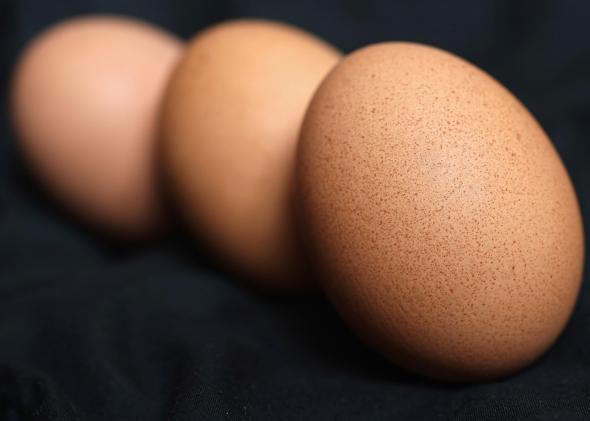A startup called Beyond Eggs, fronted by an enthusiastic founder named Joshua Tetrick, has been making headlines lately—most recently in a Mother Jones article that asks, without beating around the bush, “Can Silicon Valley Make Fake Meat and Eggs That Don’t Suck?” My former colleague Farhad Manjoo has also profiled the company, whose goal is to engineer products that mimic chicken eggs’ every culinary function. (There are supposedly 22 of them, to be exact.)
Tetrick’s goal isn’t just to appeal to people who are trying to reduce their meat and dairy intake—it’s to shake up processed food by giving food scientists a cheaper, shelf-stable, humane alternative to chicken eggs. “This isn’t just going to happen in San Francisco, in a world of vegans,” he told Mother Jones’ Sydney Brownstone. “This is going to happen in Birmingham, Alabama. This is going to happen in Missouri, in Philadelphia.” So far, Tetrick’s team at Hampton Creek Foods has succeeded in making a pea-protein-based mayonnaise (which Brownstone says “tasted exactly like the real mayo that I’ve slathered on sandwiches countless times before”), a cookie dough that Manjoo prefers to eggy dough, and—the pièce de résistance—a muffin. Here’s Brownstone:
Tetrick’s product has already fooled some key testers. Eight months before my tour, at a high-profile Khosla Ventures investment conference, Beyond Eggs staged a blind tasting of its blueberry muffin and a real-egg version. Former British Prime Minister Tony Blair reported that he couldn’t tell the difference. Neither could Bill Gates—who was so impressed he became an investor in the company.
Tony Blair and Bill Gates are two very rich, very influential people, and Brownstone’s description of the blind taste test is clearly meant to imply that Tetrick is onto something revolutionary here. But I wonder whether the media hullabaloo about Beyond Eggs is a tad overblown.
I haven’t tried Beyond Eggs’ products, but I have tried eggless muffins, cookies, and mayonnaise that weren’t funded by billionaires and yet still tasted just as good as the kinds with eggs. And why shouldn’t they? A typical muffin recipe contains one egg per dozen muffins—with a concentration that low, it’s no wonder you can hardly tell the difference when Ener-G Egg Replacer or ground flaxseeds (two popular vegan egg substitutes that have been around for years) take the egg’s place. As a vegan colleague of mine puts it, “I’ve never eaten a vegan baked good and thought, ‘This could use some eggs!’ ” (Butter is a different story.) And I know numerous non-vegetarian condiment-lovers who claim that Vegenaise, which is emulsified with soy protein, is better than egg-containing mayonnaise. This isn’t surprising, either—mayonnaise is mostly oil by volume.
The truth is, binding and emulsifying—as eggs do in muffins and mayonnaise, respectively—are two of eggs’ 22 properties that food scientists have already figured out how to mimic. What would be really revolutionary is a vegan product that you could whip into a meringue—or, for that matter, fry, poach, or scramble. (The only savory brunch options vegans have at the moment are tofu scrambles, which aren’t always terrible but are almost always mushier than scrambled eggs.) Of course, Tetrick’s team of engineers and food scientists are on it—but the results aren’t great so far. Manjoo writes, “One of Hampton Creek’s scientists cooked up a plate for me, and I found the fake scramble slightly rubbery and grainy, more like a spongy crepe than an egg.”
I’ll start getting excited about Beyond Eggs when and if it cracks that code.
